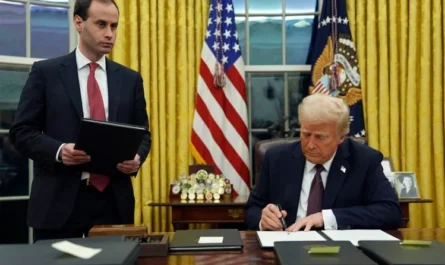Elon Musk’s social media platform, X, formerly known as Twitter, has filed a lawsuit against California law AB2655, a statute aimed at curbing political misinformation and AI-generated deepfakes on major web platforms. According to X, the law imposes unconstitutional restrictions that could violate First Amendment rights and result in widespread censorship of political speech.
Key Points About AB2655
California’s AB2655, also referred to as the Defending Democracy from Deepfake Deception Act of 2024, is part of a broader legislative effort to regulate the emerging threats posed by AI-generated content. Signed into law by Governor Gavin Newsom on September 17, the bill is one of several initiatives aimed at limiting the harmful effects of deepfakes and AI-driven political misinformation.
The law requires major web platforms to identify and act against politically misleading content created or amplified by artificial intelligence. It also sets forth mechanisms for reporting false information and allows elected officials to request legal injunctions if platforms fail to comply. While the intention is to protect the democratic process, Elon Musk’s X has challenged the bill, arguing that its scope is overly broad and violates constitutional protections.
X’s Legal Argument
As first reported by Bloomberg, X filed its lawsuit in federal court in Sacramento on Thursday. The 65-page complaint asserts that AB2655 threatens free speech by imposing burdensome regulations on content moderation for political expression.
X claims that the law would force social media platforms to remove content based on political viewpoints or potential inaccuracy, creating a chilling effect on open political discourse. The filing emphasizes that First Amendment protections extend even to speech that is potentially false when it criticizes the political class or government authority.
The company argues that compliance with AB2655 would require platforms to engage in widespread censorship. It also points out that the law includes requirements for reporting misleading content and giving government officials the power to enforce injunctions, which X views as excessive and intrusive.
Provisions and Exceptions
AB2655 contains certain exceptions designed to balance regulation with freedom of expression. For instance, traditional broadcasting stations, newspapers, magazines, and other periodicals of general circulation that meet specific criteria are exempt from the law. Additionally, content that is satirical or parodic is explicitly excluded from enforcement.
Despite these exceptions, X argues that the bill still imposes unreasonable constraints on social media platforms, particularly in the context of AI-generated content related to elections. The lawsuit suggests that the law’s broad definitions and reporting requirements could inadvertently suppress legitimate political discourse.
Governor Newsom and California’s AI Measures
California has been proactive in addressing the risks associated with AI technologies. In addition to AB2655, the state has passed other legislation targeting sexually explicit deepfakes and misinformation spread through AI-generated content. The overarching goal is to protect citizens from manipulative or harmful digital media while safeguarding democratic institutions.
However, the legal challenge by X underscores the tension between regulating emerging technologies and protecting constitutional rights. Elon Musk’s social media platform contends that the law fails to achieve a balance, risking overreach and censorship.
Preliminary Injunctions
In response to X’s lawsuit, a federal judge issued a preliminary injunction against AB2655 and related bills shortly after Governor Newsom signed them into law. The injunction temporarily halts enforcement while the legal challenge proceeds, highlighting the complex constitutional issues surrounding AI regulation and free speech.
The injunction indicates that courts are taking claims about First Amendment violations seriously, particularly in the context of laws that regulate online platforms and digital content. Legal experts note that this case could set a significant precedent for how states regulate AI-driven misinformation and social media speech.
Broader Implications for Social Media and AI
The legal battle over AB2655 has implications far beyond California. As AI technology advances, platforms like X, Meta, and others are increasingly tasked with moderating deepfake videos, manipulated political messages, and other forms of synthetic content. Laws like AB2655 represent one approach to managing these challenges, but they also raise questions about censorship, liability, and free expression.
If California prevails, other states may adopt similar legislation targeting AI-driven misinformation. Conversely, if X succeeds, the ruling could limit the ability of states to enforce strict content moderation rules, reinforcing protections for political speech on digital platforms.
The Ongoing Debate
Supporters of AB2655 argue that AI-generated misinformation poses a real and immediate threat to elections and public trust. They contend that platforms must be held accountable for content that could mislead voters or manipulate public opinion. Opponents, including X, warn that such laws risk creating a censorship regime, undermining democratic discourse and chilling legitimate debate.
This case highlights the difficult balance between technology regulation and civil liberties. As AI becomes more sophisticated, policymakers, social media companies, and courts must navigate uncharted territory to protect both democracy and free speech.
Conclusion
Elon Musk’s X has taken a firm stance against California law AB2655, arguing that it violates First Amendment rights and imposes excessive obligations on social media platforms. The law, aimed at curbing AI-generated political misinformation, reflects growing concerns about the impact of synthetic media on elections. However, the lawsuit and subsequent preliminary injunction demonstrate the legal and constitutional challenges of regulating emerging technologies.
As this case unfolds, it could shape the future of AI content regulation, social media oversight, and free speech protections in the United States. Both lawmakers and platforms will need to carefully consider how to address AI-driven misinformation while upholding the rights of citizens to express political opinions online.




